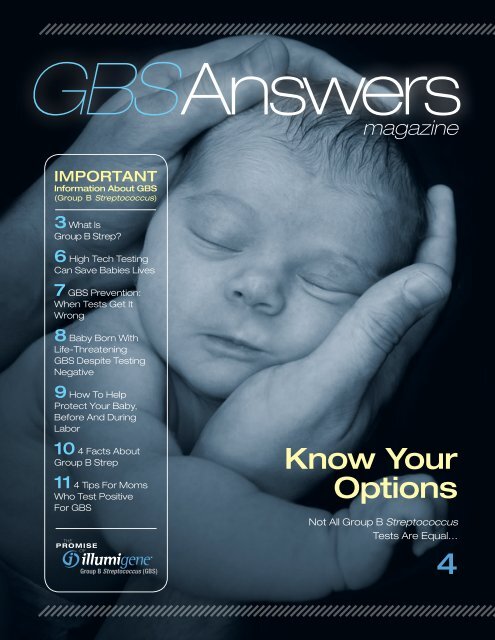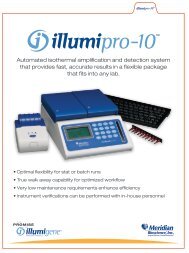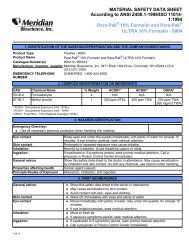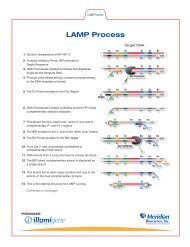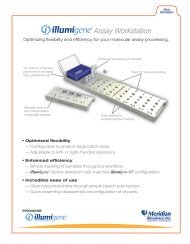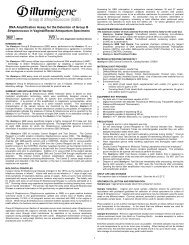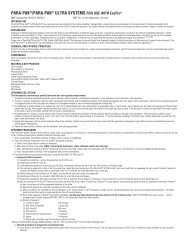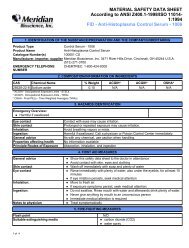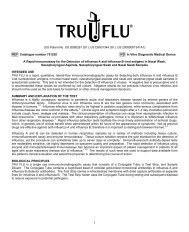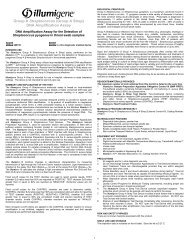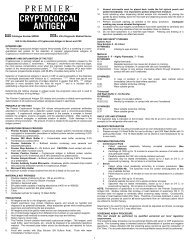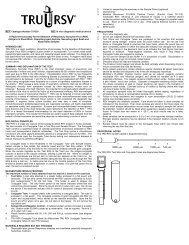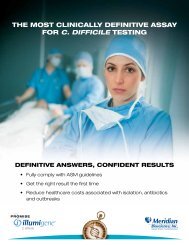GBS Answers - Meridian Bioscience, Inc.
GBS Answers - Meridian Bioscience, Inc.
GBS Answers - Meridian Bioscience, Inc.
Create successful ePaper yourself
Turn your PDF publications into a flip-book with our unique Google optimized e-Paper software.
<strong>GBS</strong><strong>Answers</strong><br />
magazine<br />
IMPORTANT<br />
Information About <strong>GBS</strong><br />
(Group B Streptococcus)<br />
3 What Is<br />
Group B Strep?<br />
6 High Tech Testing<br />
Can Save Babies Lives<br />
7 <strong>GBS</strong> Prevention:<br />
When Tests Get It<br />
Wrong<br />
8 Baby Born With<br />
Life-Threatening<br />
<strong>GBS</strong> Despite Testing<br />
Negative<br />
9 How To Help<br />
Protect Your Baby,<br />
Before And During<br />
Labor<br />
10 4 Facts About<br />
Group B Strep<br />
11 4 Tips For Moms<br />
Who Test Positive<br />
For <strong>GBS</strong><br />
Know Your<br />
Options<br />
Not All Group B Streptococcus<br />
Tests Are Equal…<br />
4
ABOUT MERIDIAN BIOSCIENCE, INC.<br />
<strong>Meridian</strong> is a fully integrated life science company that<br />
develops, manufactures, markets and distributes a broad<br />
range of innovative diagnostic test kits, purified reagents<br />
and related products and offers biopharmaceutical enabling<br />
technologies. Utilizing a variety of methods, these products<br />
and diagnostic tests provide accuracy, simplicity and speed<br />
in the early diagnosis and treatment of common medical<br />
conditions, such as gastrointestinal, viral and respiratory<br />
infections. <strong>Meridian</strong>’s diagnostic products are used outside of<br />
the human body and require little or no special equipment.<br />
The Company’s products are designed to enhance patient<br />
well-being while reducing the total outcome costs of<br />
healthcare. <strong>Meridian</strong> has strong market positions in the areas<br />
of gastrointestinal and upper respiratory infections, serology,<br />
parasitology and fungal disease diagnosis. In addition,<br />
<strong>Meridian</strong> is a supplier of rare reagents, specialty biologicals<br />
and related technologies used by biopharmaceutical<br />
companies engaged in research for new drugs and vaccines.<br />
The Company markets its products and technologies<br />
to hospitals, reference laboratories, research centers,<br />
diagnostics manufacturers and biotech companies in more<br />
than 60 countries around the world.<br />
<strong>Meridian</strong> was recently recognized by Forbes as one of<br />
America’s 100 Most Trustworthy Companies.
<strong>GBS</strong><strong>Answers</strong><br />
What Is<br />
Group B Strep?<br />
Group B Streptococcus, or <strong>GBS</strong>, is a gram<br />
positive bacteria commonly found in the<br />
gastrointestinal, genital and urinary tract of<br />
healthy adults. Approximately 25% of all<br />
pregnant women are colonized with <strong>GBS</strong>.<br />
While Group B Streptococcus colonized<br />
mothers typically show no symptoms or<br />
adverse health effects, the bacteria can be<br />
passed to their child during labor and delivery.<br />
Invasive Group B Streptococcal disease emerged in the 1970’s<br />
as the leading cause of infectious disease in infants. Infants with<br />
early onset infection (
When It Comes to <strong>GBS</strong><br />
Testing, Ask for the Best<br />
There was a time when losing newborns to Group<br />
B Streptococcus (<strong>GBS</strong>) was not at all rare. In the<br />
last few decades that has changed. Tragically, it still<br />
happens, but not nearly as often as it used to. The<br />
reason for the improvement? Routine diagnostic<br />
<strong>GBS</strong> testing of pregnant women.<br />
61.4%<br />
Of term infants with<br />
<strong>GBS</strong> disease were born<br />
to women who had<br />
tested negative for <strong>GBS</strong><br />
before delivery<br />
(99.5% were tested with traditional culture)<br />
Van Dyke, et al., NEJM, June 18, 2009; 360(25):2626-36<br />
Approximately 90 percent of pregnant women who get prenatal care are now<br />
being tested for Group B Strep. When a woman tests positive, she is treated<br />
with IV antibiotics during delivery, preventing the transmission of bacteria<br />
that is harmless in mom, but can be deadly to a newborn. That’s the good<br />
news. The bad news is that laboratory tests aren’t perfect and can sometimes<br />
return a negative result when the mother is actually a carrier of <strong>GBS</strong>. Studies<br />
indicated that perhaps more than half of term infants born with <strong>GBS</strong> are born<br />
to mothers who had tested negative for the bacterium.<br />
The traditional method of testing for <strong>GBS</strong> is to take a vaginal swab from the<br />
mother at 35 to 37 weeks in her pregnancy. This sample is cultured to give<br />
the bacteria an opportunity to grow, and then examined to determine if <strong>GBS</strong> is<br />
present. In this traditional method, there are many steps along the way where<br />
mistakes can be introduced, explains Donna Mayne B.S (MT) ASCP, (CLS)<br />
NCA, Molecular Lab Manager at Sacred Heart Hospital in Pensacola, Florida.<br />
“Reading the culture is subjective and the bacteria can take two different<br />
forms,” she says. “One is easy to see; the other is subtle.” The result is that<br />
some women who should be testing positive for <strong>GBS</strong> are getting negative<br />
results back from their tests.<br />
“Accurate testing for <strong>GBS</strong> is so important,” explains Marti Perhach,<br />
President and Founder of the Group B Strep International. “Otherwise,<br />
moms who test negative are given false assurances that they don’t need<br />
to be concerned about helping protect their baby from Group B Strep.<br />
According to a 2009 Study in The New England Journal of Medicine,<br />
4
<strong>GBS</strong><strong>Answers</strong><br />
61 percent of moms who test<br />
negative were actually positive but<br />
the test results were inaccurate.<br />
This translates to babies becoming<br />
infected by <strong>GBS</strong> when there are<br />
proven prevention strategies in<br />
place to protect them during labor<br />
and delivery had their mother’s test<br />
result been positive.”<br />
Fortunately, modern science has<br />
provided an elegant solution to<br />
this problem. A molecular assay,<br />
which locates the piece of DNA<br />
that indicates the presence of <strong>GBS</strong>,<br />
is far more sensitive, says Mayne.<br />
<strong>Meridian</strong> <strong>Bioscience</strong> markets<br />
illumigene ® Group B Streptococcus,<br />
a molecular assay that can locate<br />
<strong>GBS</strong>. Molecular assays are faster<br />
and much more sensitive,” says<br />
Mayne. “Culture-only tests are<br />
accurate less than 50 percent of<br />
the time which is close to flipping a<br />
coin. Molecular testing technology<br />
is now available which is both more<br />
accurate and faster, according to the<br />
NEJM study,” notes Perhach.<br />
Speak Up<br />
<strong>GBS</strong> testing is now a routine part of<br />
prenatal care. The woman goes in for<br />
the test, the clinic sends the swab to<br />
a lab. The results come back, either<br />
positive or negative. An infant’s life<br />
may hang in the balance, but the<br />
mom has no idea what method the<br />
lab is using and all too often, the<br />
doctor doesn’t either.<br />
“As consumers, we never say, ‘I<br />
need a car,’” says Jack Kraeutler,<br />
CEO of <strong>Meridian</strong> <strong>Bioscience</strong>, <strong>Inc</strong>.<br />
“We are specific. We shop for<br />
an SUV with 4-wheel drive or a<br />
subcompact that gets good gas<br />
mileage. But in medicine we don’t<br />
even ask.” Mayne also thinks we<br />
should speak up and request quality.<br />
“I encourage women to get tested,<br />
and when you go in for the test ask<br />
your doctor to use a lab that uses a<br />
molecular assay,” she says.<br />
Don’t be shy about asking. Your<br />
child’s life could depend on it.<br />
––––––––––––––––––––––––––––––––<br />
For more information:<br />
http://www.meridianbioscience.com/diseaseinformation/group-b-streptococcus/patients.aspx<br />
http://www.groupbstrepinternational.org/<br />
http://www.marchofdimes.com/pregnancy/<br />
complications_groupb.html<br />
5
High Tech<br />
Testing Can Save<br />
Babies’ Lives<br />
illumigene ® <strong>GBS</strong><br />
test module<br />
Meet the new technology helping to improve the<br />
diagnosis of Group B Streptococcus, the most common<br />
cause of life-threatening infections in newborns.<br />
Sometimes new technologies are<br />
so obvious you can’t miss them:<br />
Smart phones and automatic flush<br />
toilets are hard not to notice. Other<br />
technologies tend to stay in the<br />
background, but that doesn’t mean<br />
they aren’t having profound effects<br />
on our lives. One such technology<br />
named illumigene ® <strong>GBS</strong> is a<br />
molecular assay to detect Group B<br />
Streptococcus (<strong>GBS</strong>) colonization<br />
in women. <strong>GBS</strong> can be transmitted<br />
from healthy moms to their babies<br />
during birth. <strong>GBS</strong> doesn’t harm the<br />
mothers, but it can kill a newborn<br />
within a few hours.<br />
Currently the majority of laboratories<br />
in the U.S are using a traditional<br />
culture method. The patient sample<br />
that you send to the laboratory is<br />
placed in a growth medium, and<br />
then streaked on to a culture plate.<br />
The plate is then examined to see<br />
if any bacteria are present. The<br />
problem with this test is that it lacks<br />
sensitivity, studies have shown<br />
sensitivity to be as low as 42%. 1<br />
Also the procedure is multi-step,<br />
cumbersome and time-consuming,<br />
and depends on subjective<br />
evaluation by lab technicians.<br />
A New Approach…<br />
Now, however, there is a new and<br />
improved way to test for <strong>GBS</strong>.<br />
Advances in molecular technology<br />
have made it possible to place the<br />
sample in an enrichment broth for as<br />
little as 18 hours, then go directly to<br />
assay testing to check for presence<br />
of <strong>GBS</strong>, providing a more definitive<br />
answer than traditional methods,<br />
explains Michael Jozefczyk, MD,<br />
president of ClearPath Diagnostics<br />
in Syracuse, New York. Molecular<br />
testing of this sort has certainly not<br />
replaced conventional diagnostics,<br />
but it has made more accurate<br />
results possible for a variety of tests,<br />
particularly <strong>GBS</strong>. illumigene ® <strong>GBS</strong><br />
is both faster and more sensitive,<br />
giving doctors and hospitals more<br />
confidence in the results.<br />
Childbirth is a natural part of life,<br />
and fortunately it usually goes well<br />
without a need for much high-tech<br />
intervention. But screening for <strong>GBS</strong><br />
with illumigene ® , even if done<br />
quietly and behind the scenes, can<br />
help mothers and doctors make sure<br />
that when babies arrive, they are<br />
free of the potentially deadly <strong>GBS</strong><br />
bacterium.<br />
––––––––––––––––––––––––––––––––<br />
1. Fabien Rallue, et al. Sensitivities of Antigen<br />
Detection and PCR Assays Greatly <strong>Inc</strong>reased<br />
Compared to That of the Standard Culture Method<br />
for Screening for Group B Streptococcus Carriage<br />
in Pregnant Women. Journal of Clinical Microbiology,<br />
March 2006, p. 725-728.<br />
6
<strong>GBS</strong><strong>Answers</strong><br />
When Tests<br />
Get It Wrong<br />
There are few things more devastating than<br />
losing a child — especially when it could have<br />
been prevented. The tiny lives lost each year<br />
from infection with Group B Streptococcus<br />
can be saved by better screening and<br />
appropriate treatment.<br />
Group B Strep (<strong>GBS</strong>) is just one of<br />
the many bacterial communities that<br />
colonize a healthy adult. <strong>GBS</strong> bacteria<br />
live harmlessly in approximately 25<br />
percent of healthy women. However,<br />
when the bacteria are transmitted to<br />
a baby during birth, the newborn can<br />
become seriously ill.<br />
Negative Test,<br />
False Reassurance<br />
Stephanie Worthy was tested for<br />
<strong>GBS</strong> 33 weeks into her pregnancy<br />
and the test was negative. Her<br />
son, Jaxton, was born on the<br />
evening of December 7, 2011. He<br />
was completely healthy and sailed<br />
through all the newborn tests with<br />
high marks. Six hours later he<br />
was in neonatal intensive care for<br />
observation. Four days later he was<br />
dead. “They didn’t diagnose him<br />
[with <strong>GBS</strong>] for eight hours,” Worthy<br />
explains, presumably because her<br />
<strong>GBS</strong> test was negative.<br />
RaeAnne Latimore also tested<br />
negative for <strong>GBS</strong>, at 35 and a<br />
half weeks. Her son, Blake, was<br />
born at 5:30 in the afternoon of<br />
January 6, 2012, one month after<br />
Jaxton Worthy was born. At one<br />
o’clock the next morning Blake<br />
was making strange grunting<br />
sounds and Latimore couldn’t<br />
rouse him for feeding. She<br />
became concerned, but the nurse<br />
reassured her that the noises were<br />
normal. Latimore insisted that they<br />
look Blake over in the nursery.<br />
Half an hour later the doctor came<br />
in to tell Latimore that Blake was<br />
seriously ill. At 8:37 that morning,<br />
“our little fighter gave up his fight,”<br />
says Latimore. “They ruled out<br />
<strong>GBS</strong> because of my negative<br />
test,” she explains, but a nurse<br />
practitioner who had been on<br />
the team that tried to save him<br />
thought the symptoms looked like<br />
<strong>GBS</strong> and asked the pathologist to<br />
check for it in the autopsy.”<br />
She was right. <strong>GBS</strong> infection was<br />
the cause of Blake’s death. “Testing<br />
negative doesn’t mean you are<br />
negative,” warns Worthy.<br />
Better Tests<br />
“False negatives can be a problem,”<br />
explains Amanda Smith, medical<br />
technologist in the microbiology<br />
department at The Pathology Lab in<br />
Lake Charles, Louisiana. “We were<br />
researching why even with patients<br />
who were getting good prenatal care,<br />
mothers who tested negative were<br />
sometimes delivering babies that<br />
were infected,” says Smith. In January<br />
of this year, The Pathology Lab<br />
switched from the old culture-based<br />
test to the illumigene ® <strong>GBS</strong> test from<br />
<strong>Meridian</strong> <strong>Bioscience</strong>, <strong>Inc</strong>. because<br />
the molecular test is more sensitive,<br />
according to Smith. As more labs<br />
switch to the more sensitive molecular<br />
test, perhaps outcomes like Blake’s<br />
and Jaxton’s will become even more<br />
uncommon.<br />
7
Baby Born with Life-<br />
Threatening <strong>GBS</strong> Despite<br />
Testing Negative<br />
Although Crystal Mikos<br />
tested negative during<br />
pregnancy, her little<br />
boy was born with <strong>GBS</strong><br />
and a series of deadly<br />
complications. But this<br />
baby beat the odds.<br />
Crystal Mikos did everything right. Her pregnancy was perfectly normal.<br />
She was screened for Group B Strep (<strong>GBS</strong>) around 35-37 weeks, as<br />
recommended by the CDC, and tested negative. At 38 weeks, Mikos’<br />
doctor did a procedure called “stripping the membranes” (or sometimes<br />
“sweeping the membranes”) in an attempt to get her to go into labor. This<br />
technique, in which the doctor or midwife runs a finger gently around the<br />
bag of water to separate it from the uterus, is generally considered safe<br />
and is still sometimes used; but many physicians and midwives avoid it<br />
because it is yet another opportunity to introduce infection.<br />
8
<strong>GBS</strong><strong>Answers</strong><br />
A Host of<br />
Complications<br />
At 40 weeks, Mikos’ doctor induced<br />
labor. After 30 hours of labor, the baby’s<br />
heart rate plummeted and Mikos had<br />
to have an emergency C-section.<br />
“I only remember that when Anthony<br />
was born, I heard nothing — no<br />
crying, nothing. Then I passed out.”<br />
When she came to in recovery, her<br />
fiancé told her that the baby was in<br />
neonatal intensive care with major<br />
complications.<br />
As Mikos later learned, Anthony had<br />
many problems, including pneumonia,<br />
meconium aspiration syndrome,<br />
severe edema, and respiratory<br />
distress because the umbilical cord<br />
had been wrapped around his neck.<br />
But the most serious of the complications<br />
was <strong>GBS</strong>. Even though the <strong>GBS</strong><br />
screening test had come back negative,<br />
blood tests after he was born<br />
found <strong>GBS</strong> in little Anthony’s blood.<br />
Because of the many serious problems<br />
Anthony was dealing with,<br />
Mikos was told that if he lived, he<br />
might have brain damage, blindness<br />
or hearing loss.<br />
Anthony spent 17 excruciating days<br />
in NICU, but he survived. Now, almost<br />
two years later, he is a happy, healthy,<br />
perfectly normal toddler — no blindness,<br />
no hearing loss, no neurological<br />
problems. Excellent neonatal care<br />
and a lot of luck saved Anthony. But<br />
the screening test intended to prevent<br />
his ordeal did not.<br />
Be a Partner<br />
There is no way of knowing whether<br />
the membrane sweep introduced<br />
the bacteria after the negative <strong>GBS</strong><br />
test or if the test itself was faulty or<br />
perhaps misread. No medical test<br />
How to Help Protect<br />
Your Baby, Before and<br />
During Labor<br />
In addition to adhering to the<br />
CDC’s early-onset prevention<br />
strategy, Moms can take additional<br />
precautions to help protect<br />
their babies from Group B Strep.<br />
The two pillars of the Centers<br />
for Disease Control and Prevention’s<br />
recommendation to protect<br />
against early-onset <strong>GBS</strong> are to test<br />
all women during week 35 – 37 of<br />
In addition to asking your<br />
doctor about your <strong>GBS</strong> test,<br />
you should:<br />
• See your provider promptly<br />
for any symptoms of vaginal<br />
infection. Get a copy of all test<br />
results and keep them with you.<br />
• Take caution regarding<br />
invasive procedures.<br />
• Discuss the benefits vs.<br />
risks of possible methods of<br />
induction with your provider<br />
early in pregnancy as not all<br />
providers ask before “stripping”<br />
membranes.<br />
is 100 percent reliable and there are<br />
many ways to contract an infection.<br />
But there is a lot moms can do to<br />
improve the odds that their babies<br />
will be born healthy and stay healthy.<br />
“I know doctors get tired of patients<br />
coming in with information they’ve<br />
read on the Internet,” Mikos says.<br />
their pregnancy, and to administer<br />
antibiotics during labor to those<br />
who test positive.<br />
For the test, a swab will be used<br />
to collect a sample. According<br />
to CDC, about 25 percent of<br />
pregnant women are carriers of<br />
the bacteria and should be treated<br />
during delivery. Ask your doctor<br />
for illumigene ® <strong>GBS</strong>.<br />
• If you are having a planned<br />
C-section, talk to your provider<br />
about the risks vs. benefits of<br />
starting IV antibiotics well before<br />
your incision. C-sections may<br />
not completely prevent <strong>GBS</strong> infection,<br />
although the risk during<br />
a planned C-section is extremely<br />
low if performed before your<br />
labor starts/water breaks.<br />
The CDC says pregnant women<br />
who test positive or have had a<br />
previous infant with <strong>GBS</strong> should<br />
receive antibiotics through the vein<br />
during labor. This method is only<br />
effective during labor because the<br />
bacteria can grow back quickly.<br />
But she still recommends being an<br />
outspoken partner with your health<br />
care providers. Ask questions, get<br />
answers and do your homework. The<br />
more you know and the more input<br />
you provide, the better your chances<br />
of a happy outcome like the one Anthony<br />
and his parents enjoy.<br />
9
4 Facts<br />
About Group B Strep<br />
Group B Strep is the<br />
most common cause<br />
of life-threatening<br />
infections in newborns,<br />
so why haven’t<br />
you heard of it?<br />
Understand these<br />
four important facts<br />
about these naturallyoccurring<br />
bacteria.<br />
1<br />
Not all newborns<br />
exposed to <strong>GBS</strong><br />
become infected<br />
One in four pregnant women carry<br />
Group B Streptococcus (Group B Strep<br />
or <strong>GBS</strong>) in their digestive tract and birth<br />
canal, but not all newborns exposed<br />
to <strong>GBS</strong> are infected. Many Moms<br />
wonder why. Why are some babies just<br />
fine while others suffer from potentially<br />
deadly complications at the hands of the<br />
infection?<br />
Dr. Carol J. Baker, professor of pediatrics<br />
at Baylor College of Medicine in Houston<br />
explains that there are many potential<br />
answers to this question, but the main<br />
reason seems to be that some women<br />
have developed a natural immunity to<br />
<strong>GBS</strong>. “Your baby doesn’t get tetanus<br />
if you had the vaccine because your<br />
protection goes through the placenta to<br />
keep the baby well until he or she starts<br />
getting vaccinated,” she explains. “This<br />
analogy explains what happens with<br />
<strong>GBS</strong>. We don’t know which women are<br />
protected, but some have developed<br />
immunity naturally and they pass that<br />
along to the baby.”<br />
2<br />
Although the<br />
bacteria is usually<br />
harmless to Moms,<br />
it can cause deadly<br />
infections in babies<br />
Although the naturally occurring bacteria<br />
is usually harmless to the mother, it is the<br />
most common cause of life-threatening<br />
infections in newborns, according to<br />
the U.S. Centers for Disease Control<br />
and Prevention (CDC). <strong>GBS</strong> can cause<br />
sepsis, pneumonia or even meningitis.<br />
It can also cause babies to be stillborn,<br />
miscarried or so sick they die after birth.<br />
3<br />
Women who<br />
test positive for<br />
<strong>GBS</strong> usually have no<br />
symptoms.<br />
A woman who tests positive for <strong>GBS</strong><br />
usually does not have any symptoms,<br />
thus the importance of routine testing.<br />
“The good news is, <strong>GBS</strong> disease is highly<br />
preventable,” explains Marti Perhach,<br />
executive director, CEO and co-founder<br />
of Group B Strep International. She lost<br />
her baby girl to <strong>GBS</strong> in 1998.<br />
“If the mom is tested between weeks 35<br />
and 37, as recommended by CDC, and<br />
found to be positive, she should be given<br />
IV antibiotics for <strong>GBS</strong> during labor and<br />
delivery. However, my daughter, Rose,<br />
was stillborn fullterm because <strong>GBS</strong> had<br />
already infected her amniotic fluid and<br />
lungs before I could get my IV antibiotics.”<br />
4<br />
Group B Strep is<br />
different than strep<br />
throat and does not<br />
only affect pregnant<br />
women.<br />
<strong>GBS</strong> is not strep throat, which is caused<br />
by group A strep, and it can affect<br />
people of all ages, especially those with<br />
compromised immune systems.<br />
10
4 Tips<br />
<strong>GBS</strong><strong>Answers</strong><br />
For Moms Who Test Positive For <strong>GBS</strong><br />
Most Moms who test<br />
positive for Group B<br />
Strep will give birth<br />
to perfectly healthy<br />
babies, but that doesn’t<br />
mean they shouldn’t<br />
takes steps to protect<br />
their newborns from<br />
potentially serious<br />
illness, or even death.<br />
Doctors and real moms<br />
come together to<br />
share their best tips<br />
for handling a <strong>GBS</strong><br />
diagnosis.<br />
1<br />
Maintain an open dialogue<br />
with your doctor<br />
“My best tip for a woman who has tested<br />
positive is to discuss that result with her<br />
obstetrician,” says Dr. Carol J. Baker,<br />
professor of pediatrics at Baylor College<br />
of Medicine in Houston and executive<br />
director, Center for Vaccine Awareness &<br />
Research, Texas Children’s Hospital.<br />
Dr. Baker also advises women to have<br />
a clear plan for what will happen once<br />
they go into labor, and to be sure to be<br />
honest with their health care professionals.<br />
“People worry during pregnancy,”<br />
she says. “They wonder, ‘Am I eating<br />
the wrong thing? Am I drinking the right<br />
thing?’ The overwhelming majority of<br />
babies will be healthy whether they carry<br />
Group B Strep or not, so on one hand, I<br />
tell women not to worry; but on the other<br />
hand, if you want to know more—ask!”<br />
Think of the medical professionals you’ve<br />
surrounded yourself with as teammates<br />
in the quest for a happy, healthy birth.<br />
Trust them, of course, but don’t be afraid<br />
to seek second opinions, ask questions<br />
and do your own research.<br />
Support groups, both in-person and<br />
online, can bring comfort in community,<br />
and there are a plethora of reliable online<br />
resources, such as the CDC’s website—just<br />
make sure you’re turning to a<br />
trustworthy source.<br />
2<br />
Go to the hospital as<br />
soon as labor starts<br />
The sooner you get to the hospital, the<br />
sooner you can begin your antibiotic<br />
treatment (which should be administered<br />
intravenously). “Antibiotics to<br />
prevent <strong>GBS</strong> disease work best if given<br />
4 or more hours before the birth of the<br />
baby. Arriving to the hospital when labor<br />
is starting maximizes the chances that<br />
women can get this effective treatment<br />
in time,” explains Jonathan M. Wortham,<br />
MD, Epidemic Intelligence Service Officer<br />
for the Center for Disease Control, has<br />
taken care of extremely ill infants with<br />
<strong>GBS</strong> disease<br />
Of the mothers who test positive for <strong>GBS</strong><br />
and are treated with antibiotics in labor,<br />
the risk of infection drops from 1 in 200<br />
babies to 1 in 4,000.<br />
3<br />
Remind the hospital<br />
staff that you tested<br />
positive for <strong>GBS</strong> bacteria.<br />
Remember tip one? Trust your medical<br />
team, but you’re in charge of your own<br />
health. Don’t assume everyone has seen<br />
your files. Speak up and remind everyone<br />
you talk to, nurses included, that you<br />
tested positive for <strong>GBS</strong> bacteria, even if<br />
you think they already know.<br />
“We have a status card we give to Mom<br />
if she tests positive, just in case the results<br />
aren’t at the hospital in time for the<br />
delivery,” says Marti Perhach, executive<br />
director, CEO and co-founder of Group B<br />
Strep International. “She can show the<br />
card and expedite getting the IV antibiotics.<br />
She should also be sure to alert the<br />
nursing staff as soon as labor starts or<br />
her water breaks.”<br />
If you’re allergic to any medications, such<br />
as Penicillin, note that right away, too.<br />
4<br />
Ask your provider<br />
to not strip your<br />
membranes<br />
“The reason for that recommendation is<br />
that stripping the membranes can allow<br />
the bacteria to get closer to the baby,”<br />
explains Dr. Baker.<br />
11
WHAT’S MISSING?<br />
You may not feel sick or have any symptoms, but approximately<br />
25% of expectant mothers unknowingly carry Group B Streptococcus<br />
(<strong>GBS</strong>). Without proper treatment during labor, <strong>GBS</strong> can infect<br />
newborns with sepsis, pneumonia, and even meningitis.<br />
Screening for <strong>GBS</strong> at 35-37 weeks of pregnancy is a simple<br />
and painless way to protect your baby’s health against<br />
serious <strong>GBS</strong>-related infections.<br />
Ask your doctor to test you for <strong>GBS</strong> with illumigene ® —<br />
so you and your baby don’t miss a thing together.<br />
meridianbioscience.com/findwhatsmissing


